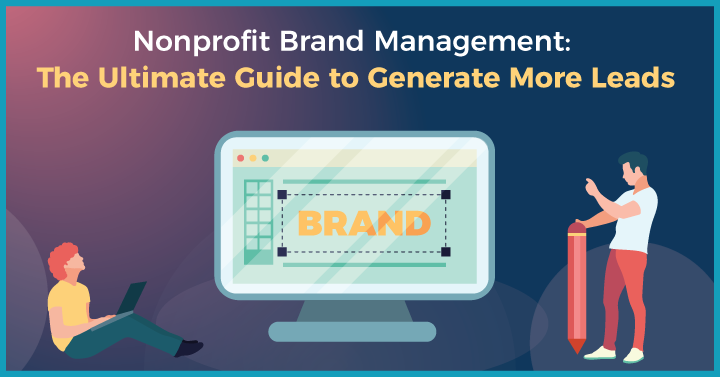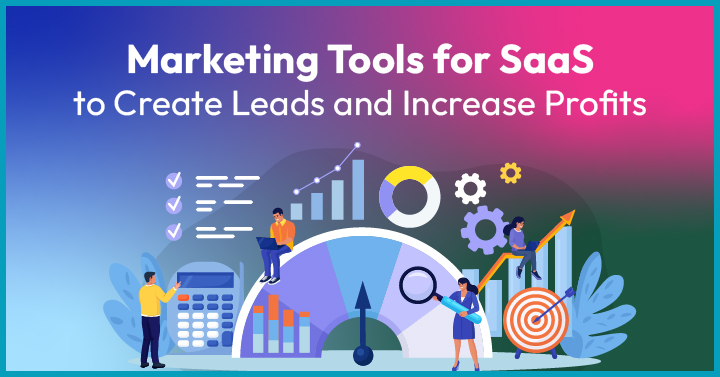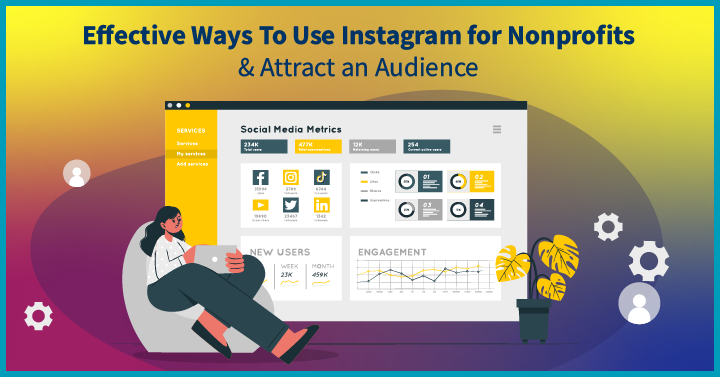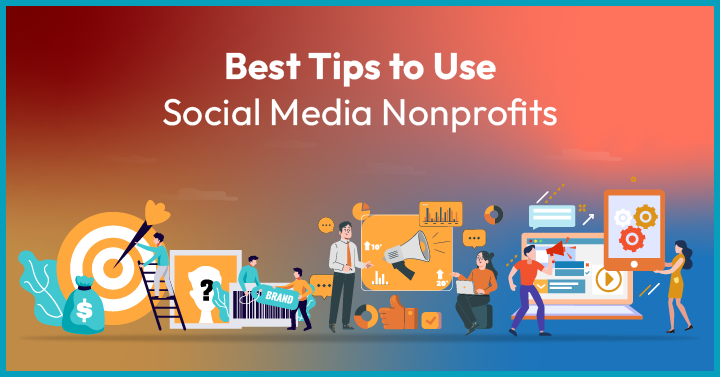In a world where virtual classrooms and e-learning platforms reign supreme, the importance of a strong online presence cannot be overstated. As educational technology (EdTech) continues to shape the way we teach and learn, mastering the art of Search Engine Optimisation (SEO) becomes a game-changer for companies in this dynamic field.
According to Passive Secrets, a whopping 75% of marketers believe that SEO is an effective strategy to achieve their marketing goals.
This isn’t just a number; it’s a testament to the transformative potential that a well-crafted SEO strategy holds for businesses operating in the EdTech realm.
By optimising the website and content for relevant keywords, edtech companies can ensure that they are visible to potential customers who are actively seeking the products or services they offer. This targeted approach helps drive qualified leads, establish authority, build trust, and foster long-term relationships with students, educators, and stakeholders.
In this blog post, we will delve into the intricacies of SEO tailored specifically for EdTech, exploring strategies to enhance your online presence and drive organic traffic.
1. What Is SEO for Edtech?
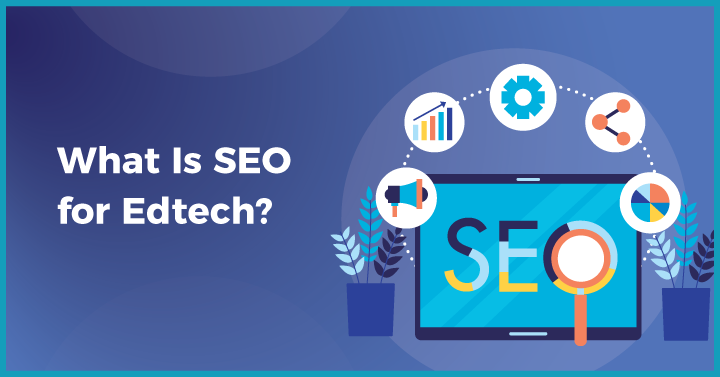
SEO for edtech includes the practices that drive more visitors to your edtech website, increasing the chances of more leads, conversions, and revenue. If you want your website to get more traffic from search engines like – Google, Yahoo, and Bing – you should not overlook SEO.
For example, let’s say you develop software for educational institutions and are trying to drive prospects to your website. To catch the attention of potential customers, your website should rank on the first page of SERP results for relevant keywords, and this is possible by implementing effective SEO best practices.
Many edtech companies use SEO strategies to get noticed by decision-makers at schools, colleges, and universities. There is no “drive traffic instantly” scheme – when it comes to SEO. It is about attracting the right people at the right time with the right content.
2. What is the Significance of SEO for Edtech?
Whether you want to grow your subscriber list or intend to boost sales of your courses, SEO for edtech is a sure-shot way to drive organic traffic. Here is a quick rundown of why you should invest in SEO –
- Drives organic traffic to your website
SEO plays a significant role in driving organic traffic to your website and increasing your visibility in search engine results. By optimising your website and content for relevant keywords, you not only improve your chances of ranking higher in search engine rankings page but also create a pathway for organic traffic to effortlessly discover and engage with what your site has to offer.
- Build trust with potential customers organically
Your edtech website is more likely to get more clicks, traffic, and leads – when your customers have a positive experience with your business. When this happens over time, your edtech website’s ranking on SERP will get closer, eventually to the top 10 positions. Again, this is because you will establish trust with your customers with a better user experience, natural links, optimised on-page elements, content marketing, and search engine signals.
- Improve your visibility in local search
When your potential customers use phrases like – ‘best colleges near me,’ ‘best universities near me,’ or ‘best DevOps course near me’ within your geographical proximity – your website is likely to appear on the first page. Therefore, increasing your online visibility will increase your chances of growing your customer base.
- Offers impressive return on investment (ROI)
Marketing ROI is a priority consideration when evaluating different marketing channels. Although it takes time to show your edtech website on top of SERPs – it eventually delivers high revenue. According to sources, websites on the first page of SERPs receive 33% traffic, which directly correlates to traffic and ROI.
3. A Step-By-Step SEO Guide for Edtech to Boost Their Online Presence
SEO is a long-term strategy that requires consistent effort and dedication. It is not a one-time task but rather an ongoing process that requires continuous optimisation and monitoring. With that in mind, let’s explore the steps you can take to boost your edtech company’s online presence through SEO:
3.1 Opt Mobile-First Index
In 2018, Google’s algorithm was updated for mobile-first indexing. It means Google predominantly uses the mobile version of the website for indexing & ranking. If your website lacks a mobile-friendly experience, it could negatively impact the site’s rankings. With 63% of search traffic originating from mobile devices, your edtech company must have a mobile-responsive website.
Here are some examples of mobile responsive website templates for your edtech –
- Free Education Responsive Web Template – Themezy
- KidKinder – Free responsive website template – Theme Wagon
- Eduma Education WordPress Theme – Theme Forest
There are several tactics to focus on to prepare for the mobile-first index. First, AMP (Accelerated Mobile Pages), which is an open-source initiative to improve the responsiveness of your website. If you manage a WordPress site, you can use the plugin to convert your pages to AMP. Besides, Progressive Web Apps (PWA) and PWAMP are the best alternatives to AMP.
3.2 Perform Keyword Research
When optimising your website, you need to figure out what search terms drive user searches. The right tools will help you understand what people are searching for on Google and what content you should provide. Integrating specific keywords into your SEO strategy can drive more organic traffic to your website.
Some education keywords generated using Google Keyword Planner are – education, higher education, homeschooling, online learning, financial literacy, education centres, and educational systems. Most of these worlds have a monthly search volume of 10,000 to 100,000 searches. Try incorporating some of them into your website.
To generate a more tailored list of keywords for your edtech website, you can alternately use Google Trends, Keyword Tool, Ahrefs Keyword Explorer, and Wordstream.
3.3 Take Care of On-Page Optimisation
Now that you have the popular keywords in the edtech industry – it’s time to use them. First, customise your list, and highlight any critical keywords relevant to your school or edtech business. Next, focus on the actual structure of the webpage and improve it.
On-page SEO strategy for edtech can have a tremendous benefit on your website. Examples of on-page SEO elements include –
Title tag – It is the first thing a user sees in the SERPs and decides if it is likely to answer his query. A well-written title tag can increase the chances of clicks and traffic. You can use Coschedule and monster insights to check the score of your headline.
Meta description – It is not a ranking factor but helps the user understand the webpage and increases the chances of CTR.
Heading tag – It is used to identify the main headings and subheadings within your content. Proper usage of H1-H6 tags adds up to the architecture of the content, especially for users and search engines.
Robots meta tag – Page with content = “noindex” attribute instructs the search engines not to index a page. For example, you would want certain pages to stay out of SERPs or while determining the overall health of your site. In such a case, these tags are of great help.
Rel=“canonical” link tag – It connects pages with the same type of content on the same subject. Using canonical tags will help steer the SEO efforts towards relevant pages, disregarding low-priority pages.
Nofollow attributes – These are your website’s external or internal links that point to relevant and high-authority sources. By adding the ‘Nofollow’ attribute, you are instructing the search engines not to follow the link or give credibility to that source.
Factors like SSL certification, permalink, social sharing, and URL improve the on-page SEO of your website. To make your website more structured and relevant – enable breadcrumbs and robots.txt.
3.4 Don’t Overlook Technical SEO
To implement SEO-friendly strategies, you need to audit your edtech website thoroughly. Search engines prefer websites that display technical characteristics such as – fast loading time, responsive design, secure connection, and core web vitals.
Register your edtech website with Google Analytics and Search Console. First, create an XML sitemap to tell your search engines where each page is. Then, add structured data markup to your website to help search engines better understand the content.
If there is any duplicate content issue, fix it – as it can confuse the users or be used to manipulate search rankings. Besides this, search engines love websites that load quickly. You can optimise page speed by implementing techniques like – Gzip compression, website caching, reducing the number of plugins, moving the website to a better host, and minimising using CSS and javascript.
3.5 Enhance Your Local Visibility
Local SEO for edtech brings the local audience to your website. To pull such traffic, you must pick a combination of medium and long-tail keywords. Before that, you need to get your company on Google My Business and get more references.
For example, instead of using specific terms such as “e-learning platform,” you can use more conversational phrases like – “Which is the best e-learning platform?” This is more likely to give the user the information they want.
Optimise your content for conversational search phrases. In addition, use tools like Ask for People and Keyword Everywhere to find common questions your audience is asking about the keywords.
3.6 Add More Internal/External Links
Optimise your website through third-party means, such as by adding more internal/external links. Also known as off-page SEO or link building, this strategy helps you build domain authority, increases the ranking, and boosts online exposure.
You can use multiple methods, such as guest blogging, influencer marketing, brand mentions, and social media activity, to promote your edtech company. High-quality link building can include submitting websites to relevant directories, promoting good content, reaching out to websites, and building relationships with web admins.
You can also join edtech communities and forums to spread the word about your brand.
3.7 Invest in SEO Tools
From keyword research to backlink analysis, a wide range of activities are involved in optimising the website for search engines. SEO is a valuable asset for your edtech; you can capitalise on it using premium tools. You need to create a well-planned SEO strategy to drive the right traffic.
There are many SEO tools that help you find relevant keywords, conduct competitor analysis, do content audits, and analyse the traffic. For example – Moz Pro, Majestic, Screaming Frog Spider, Spyfu, Cognitive SEO, and Advanced web ranking are some of the best SEO tools for edtech.
With limited features in free tools and superficial information, you can’t expect your website to reach the top of SERP results. For instance, a paid tool lets you see all the keywords where your competitor ranks, backlinks, and landing pages. Conversely, with a free tool, you will not be able to see all the keywords and backlinks – missing out on important ranking factors.
3.8 Incorporate Multilingual SEO
Multilingual SEO prepares your website for the international market. It ensures search engines can identify the countries you want to segment, target, and position customers that speak different languages. With more than 70% of non-English speaking countries, edtech must focus on multilingual or international SEO. Suppose your target audience is across the globe; you need to invest in international SEO that ensures visitors from non-English-speaking countries can discover your website and see your content.
Some edtech firms target international audiences by making separate marketing places for different countries and then performing local SEO for that country. Include a subdirectory of each country on the main website or create a separate website for each country for an effective SEO strategy.
Implementing multilingual SEO for edtech websites can be a challenging task. For instance, Yandex is preferred in eastern European countries, whereas Baidu is preferred in China. With the right SEO strategy, you can set up an international-friendly website and optimise it by considering the search engine preferences in every country.
3.9 Optimise Your Website for Voice Search
We see many people speaking into their watches and smartphones and getting voice responses. The reason? It’s hands-free, fast, and lets you multitask. However, if you have not yet included voice search in the SEO strategy of your edtech website – you could be missing out on an essential element.
According to Gartner, 60% of consumers will use voice search by 2025. To make optimum use of voice search, you need to double down on excellent content on your edtech website, written in an interactive and engaging tone.
Google relies on featured snippets to answer the queries of people on voice search. By optimising your page for featured snippets, you can make sure your website appears at the top of voice search results. Here are some tips for voice search optimisation –
- Use schema markup to ensure your content is relevant
- Add an FAQ section that provides short descriptions as answers
- Make sure the website loads at a good speed
- Optimise the website for local SEO
- Ensure the website is mobile-responsive
By following the above tips, you can reap the benefits of voice search for your edtech website.
3.10 Clean Your Website Regularly
Did you know – a dusty website not only scares away visitors but also damages Google rankings? Broken links, stale content, outdated images, and faulty contact forms are all factors that could deter users from engaging with your website. Here are a few things you can do to keep your edtech website fresh for search engines –
- Publish 3-4 blogs per month, which allows your users to stay connected with your edtech. A fresh and relevant blog post tells search engines that you are trying to solve your audience’s queries.
- Nothing deters users more than the “page not found” (401) page. Fix the broken links by analysing reports on Search Console. It might provide excellent results about analytics, inbound links, and organic search traffic. You can also use a free broken link checker to find the broken links.
- Replace older images on the website, particularly the ones that have been on the website for more than two years. This will allow you to try out new alt tags to boost your SEO efforts.
- Update the home page content regularly to follow the trend and keep the information up-to-date. This can be like experimenting with tag lines & CTAs, updating the copyright date in the footer, adding new keywords or phrases, and so on.
- Go through the statistics of your contact us page to know if they are exiting from the page or going to the “Thank you” page. If they seem to bounce back to the home page, make some changes to the user experience to boost conversions.
- Make sure all the software and plugins are up-to-date to address security vulnerabilities. Confirm how your edtech website looks on mobile.
4. Measuring and Tracking SEO for Edtech
Once you have implemented SEO strategies for your EdTech company, it is essential to measure and track your success to ensure you are heading in the right direction. This involves monitoring key metrics and analysing data to gain insights into the effectiveness of your SEO efforts.
Key Metrics to Track:
- Organic Traffic: Monitor the number of visitors coming to your website through organic search. This metric indicates the success of your SEO efforts in driving relevant traffic to your site.
- Keyword Rankings: Keep track of how your target keywords are ranking on search engine result pages. Regularly check your position and make necessary adjustments to improve your rankings.
- Conversion Rate: Measure the percentage of website visitors who complete a desired action, such as signing up for a course or purchasing a product. A higher conversion rate indicates that your SEO efforts are attracting the right audience.
- User Engagement: Additionally, you can measure user engagement metrics such as time spent on your platform, page views, and the bounce rate, which are also vital. If visitors are finding value in your content and staying engaged, it’s a positive sign that your SEO is not only driving traffic but also delivering relevant and compelling information.
5. SEO Case Study Examples

With a few examples, let us understand the significance of SEO for edtech websites.
- BlackBoard
Blackboard, one of the leading edtech companies in the world that serves K-12 and government clients from around the globe, leveraged the power of SEO to attract a dedicated audience to its website. Currently, the site gets more than 82.4 million visitors per month – most of whome are from the United States, Brazil, Mexico, and Peru. The search traffic is around 9.03 percent, out of which 99.95 is organic. They positioned themselves as the leader in the education industry by posting purposeful, engaging, and unique content on their website.
- Quizlet
Quizlet is a multi-national American edtech company that makes simple tools like – flashcards and games to study, practice, and master any subject. Pulling nearly 89.9 million visitors per month, Quizlet has gained a dedicated following, with most visitors coming from the US, United Kingdom, Canada, and Australia. In addition, they are receiving direct traffic of 25.5% and organic traffic with insightful resources across multiple categories like – engineer, design, and news.
- Clever
Clever is a trusted digital learning platform for k-12 students, parents, and teachers. Being a popular e-learning platform in the nation, it receives average traffic of 23.7 million visitors per month, with 12.25 % of traffic coming from organic search.
6. How can a Digital Marketing Agency Help?
Navigating the complex world of SEO can be challenging, especially for EdTech companies looking to dominate the online space. A digital marketing agency specialising in SEO for edtech websites can provide invaluable expertise and support to help you achieve your business goals.
Growth Ganik is a full-stack digital marketing agency that specialises in creating SEO strategies that are tailor-made for every edtech company. We conduct in-depth keyword research, optimise your website’s on-page and technical elements, create high-quality content, and regularly monitor the performance of the SEO efforts to make data-driven recommendations for improvement.
If you’re ready to take your edtech company to the next level, contact our digital marketing agency today for a FREE 45-minute consultation with our experts.
7. FAQs
- How long does it take to see results from SEO in the edtech sector?
SEO is a long-term strategy, and it takes time to see significant results. It depends on various factors, such as the competitiveness of your target keywords and the quality of your website’s content. Generally, it can take several months to start seeing noticeable improvements in your search engine rankings and organic traffic.
- Can I do SEO for my edtech company on my own, or should I hire a digital marketing agency?
While it is possible to handle SEO for your EdTech company on your own, hiring a digital marketing agency can provide numerous benefits. A digital marketing agency has the expertise and resources to develop and execute a comprehensive SEO strategy tailored to your specific goals and target audience. They can also stay up-to-date with the latest SEO trends and algorithms, ensuring that your EdTech company remains competitive in the ever-changing online landscape.
- Are there any SEO techniques that should be avoided in the education sector?
Yes, there are certain SEO techniques that should be avoided in the education sector to prevent potential penalties from search engines. These include keyword stuffing, purchasing backlinks, and creating low-quality or duplicate content. It is important to focus on providing valuable and relevant content to your target audience while adhering to ethical SEO practices.
- Is it necessary to optimise my website for mobile devices?
Absolutely! With the increasing use of smartphones and tablets, optimising your website for mobile devices is essential. Search engines prioritise mobile-friendly websites in their rankings, and a poor mobile experience can lead to higher bounce rates and lower conversion rates.
- How often should I update my website’s content for SEO purposes?
Regularly updating your website’s content is important for SEO purposes. Search engines favour websites that provide fresh and relevant content to their users. Aim to publish new content at least once a month, but remember that quality is more important than quantity. Focus on creating valuable and engaging content that addresses the needs and interests of your target audience.










